2020-2021学年北师大版(2019)选择性必修一:Unit 1 Relationships Lesson 1 课件-(27张)
文档属性
| 名称 | 2020-2021学年北师大版(2019)选择性必修一:Unit 1 Relationships Lesson 1 课件-(27张) | 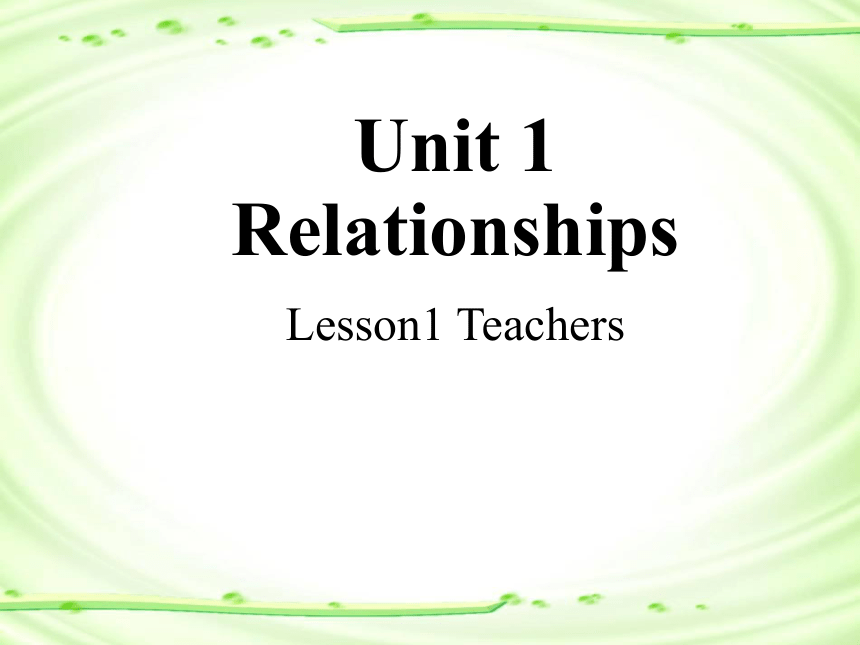 | |
| 格式 | pptx | ||
| 文件大小 | 670.8KB | ||
| 资源类型 | 教案 | ||
| 版本资源 | 北师大版(2019) | ||
| 科目 | 英语 | ||
| 更新时间 | 2021-09-07 21:57:49 | ||
图片预览



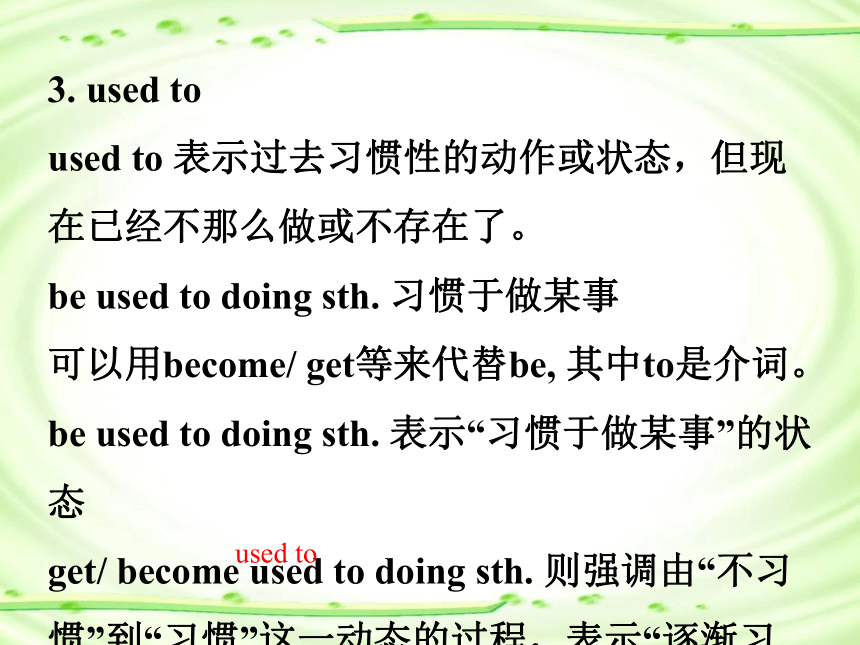
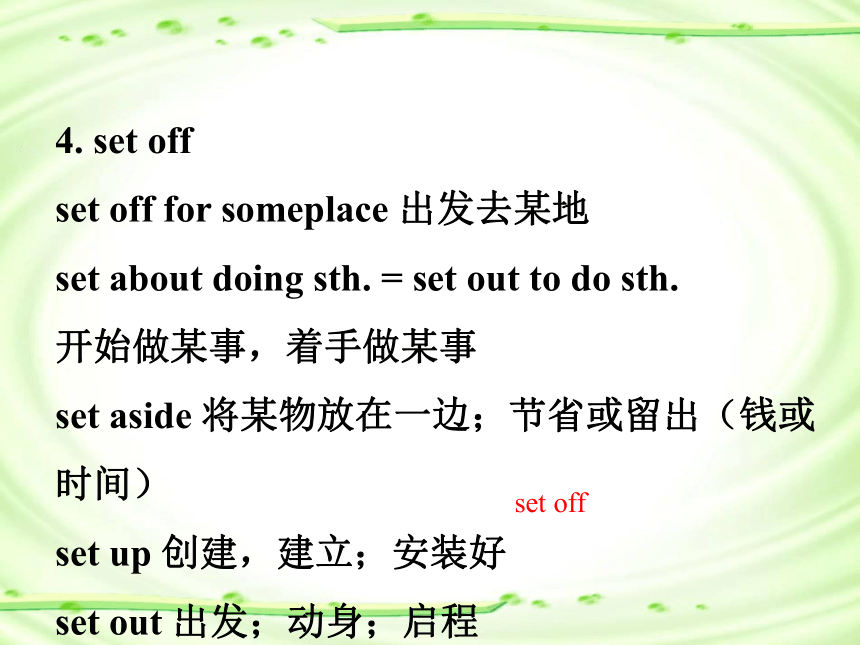
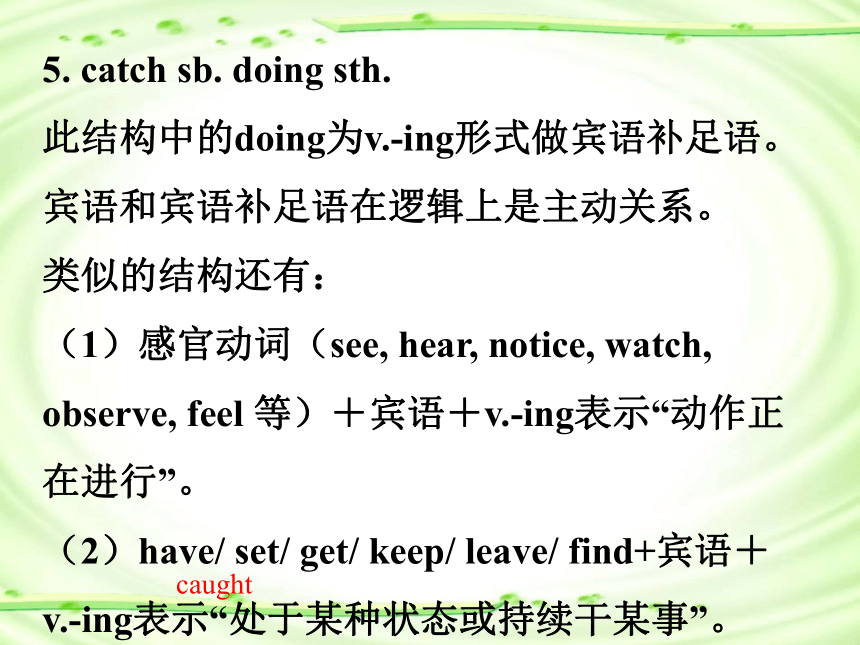
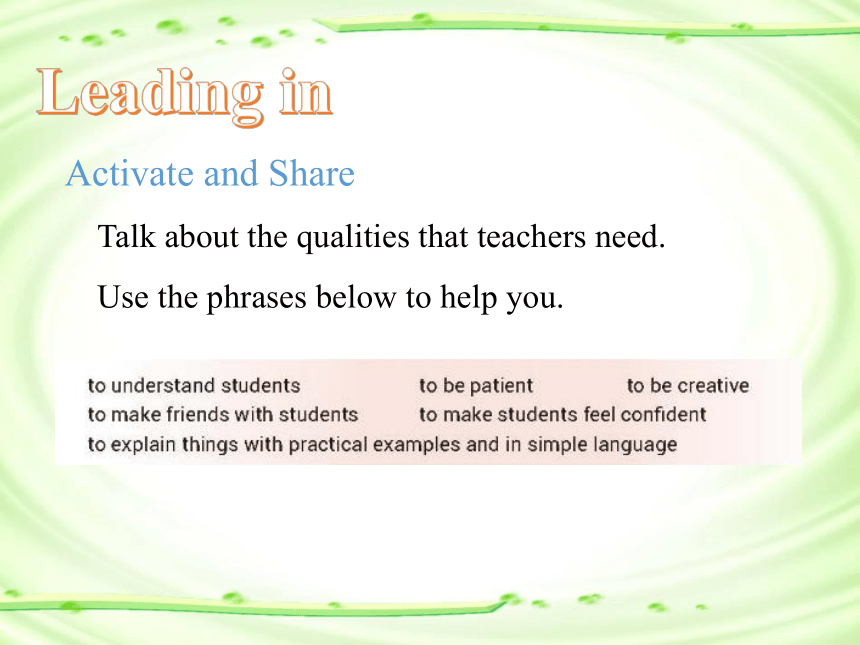
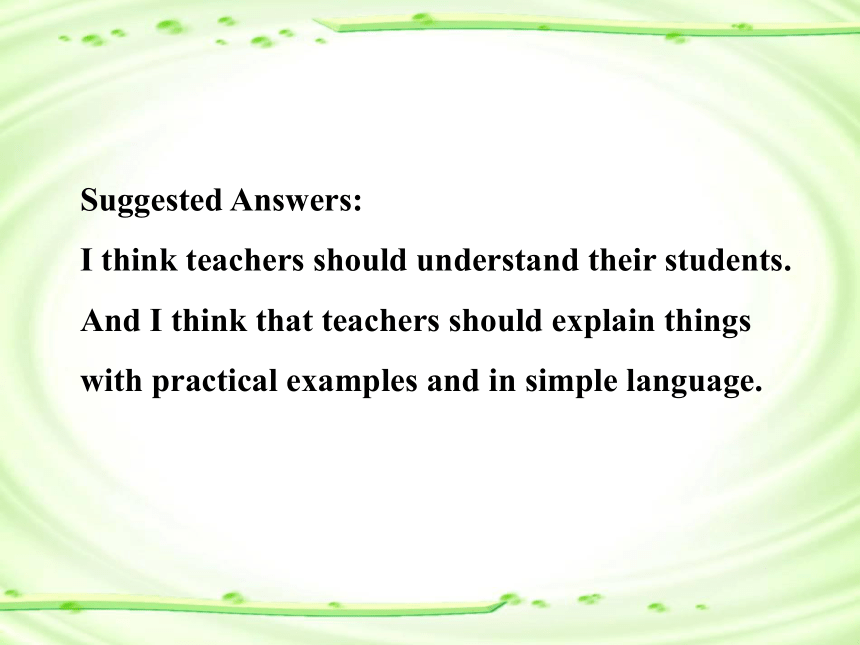
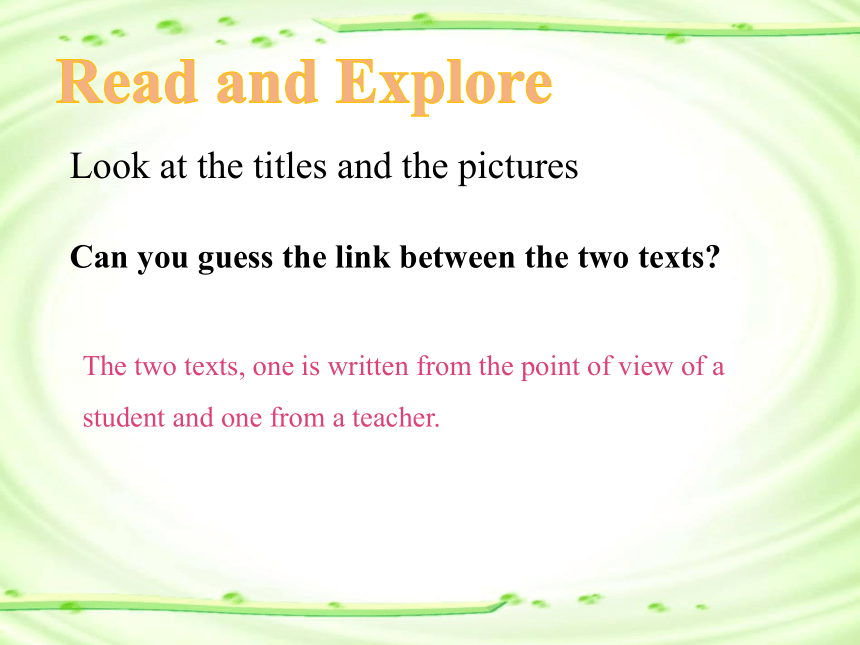
文档简介
(共27张PPT)
Unit
1
Relationships
Lesson1
Teachers
Vocabulary
1.
lack
lack
sth.
缺少某物
lack
for
nothing
什么都不缺
lack
n.
缺乏,短缺的东西
a
lack
of
sth.
缺少某物
for
lack
of
sth.
因缺少某物
lacking
adj.
缺少的;缺乏的
be
lacking
in…
缺少……
练习:He
_________
confidence
in
his
study.
lacks
2.
access
have/
get/
gain/
obtain
access
to
进入;接近;可以获取/利用
access
v.
存取;访问(计算机信息等)
accessible
adj.
易到达的;易使用的;易懂的;
inaccessible
adj.
达不到的;不可进入的;不可使用的;无法理解的
be
accessible
to=have/
get/
gain/
obtain
access
to
练习:Students
must
have
________
to
good
resources.
access
3.
used
to
used
to
表示过去习惯性的动作或状态,但现在已经不那么做或不存在了。
be
used
to
doing
sth.
习惯于做某事
可以用become/
get等来代替be,
其中to是介词。
be
used
to
doing
sth.
表示“习惯于做某事”的状态
get/
become
used
to
doing
sth.
则强调由“不习惯”到“习惯”这一动态的过程,表示“逐渐习惯”
be
used
to
do
sth.
=
be
used
for
doing
sth.
被用来做某事
练习:There
__________
be
an
old
temple
in
the
village.
used
to
4.
set
off
set
off
for
someplace
出发去某地
set
about
doing
sth.
=
set
out
to
do
sth.
开始做某事,着手做某事
set
aside
将某物放在一边;节省或留出(钱或时间)
set
up
创建,建立;安装好
set
out
出发;动身;启程
练习:What
time
are
you
going
to
_____________
tomorrow?
set
off
5.
catch
sb.
doing
sth.
此结构中的doing为v.-ing形式做宾语补足语。宾语和宾语补足语在逻辑上是主动关系。
类似的结构还有:
(1)感官动词(see,
hear,
notice,
watch,
observe,
feel
等)+宾语+v.-ing表示“动作正在进行”。
(2)have/
set/
get/
keep/
leave/
find+宾语+v.-ing表示“处于某种状态或持续干某事”。
(3)with+宾语+v.-ing,宾语与宾语补足语在逻辑上是主动关系。
练习:I
___________
John
playing
basketball
yesterday.
caught
Leading
in
Talk
about
the
qualities
that
teachers
need.
Use
the
phrases
below
to
help
you.
Activate
and
Share
Suggested
Answers:
I
think
teachers
should
understand
their
students.
And
I
think
that
teachers
should
explain
things
with
practical
examples
and
in
simple
language.
Can
you
guess
the
link
between
the
two
texts?
The
two
texts,
one
is
written
from
the
point
of
view
of
a
student
and
one
from
a
teacher.
Look
at
the
titles
and
the
pictures
Read
and
Explore
1.
Who
wrote
the
texts?
Reading
and
thinking
The
texts'
writers
are
Graham
Lawrence
and
Brian
Jenkins.
Graham
was
once
Mr
Jenkins'
student.
They
talk
about
the
memories
that
they
have
of
each
other.
2.
What
are
they
mainly
about?
3.
Why
were
they
written?
The
texts
were
written
because
the
student
and
the
teacher
remembered
how
they
influenced
each
other.
Read
the
two
texts
and
answer
the
questions.
Read
"My
Teacher".
Complete
the
information.
Before
Graham
went
to
Mr
Jenkins'
class
·Graham
was
not
very
good
at
most
school
subjects.
How
Mr
Jenkins
taught
·Mr
Jenkins
made
everything
interesting.
After
Graham
became
Mr
Jenkins'
student
·Mr
Jenkins
made
Graham
feel
that
he
had
his
own
strengthens.
·He's
a
bit
lazy.
·Science
had
been
a
subject
full
of
strange
words.
·He
didn't
want
to
know
what
hydrogen
was.
·He
found
science
boring
and
difficult.
·He
lacked
confidence.
·He
explained
things
with
lots
of
practical
examples
and
in
simple
language.
·He
took
students
outside,
and
they
built
a
rocket!
·He
was
interested
in
the
study
of
the
stars
and
planets.
·He
gave
a
presentation.
Read
"My
Student".
Answer
the
questions.
1.
What
was
Mr
Jenkins'
impression
of
Graham
before
they
met?
He
was
very
difficult.
2.
What
is
MR
Jenkins'
attitude
towards
students?
There's
no
such
thing
as
a
good
or
a
bad
student.
3.
What
are
Mr
Jenkins'
beliefs
in
teaching?
The
thing
about
being
a
teacher
is
that
you
have
access
to
children's
minds
when
they
are
open
and
eager
to
learn.
Imagine
you
are
the
head
teacher
of
Overton
School.
Prepare
a
presentation
to
tell
Graham's
and
Mr
Jenkins'
stories.
Use
the
diagram
to
help
you.
Suggested
Answers:
Graham
Lawrence
was
not
very
good
at
most
school
subjects.
He
was
a
bit
lazy.
Science
was
a
subject
full
of
strange
words
to
him.
He
didn't
want
to
know
what
hydrogen
was.
He
found
science
boring
and
difficult.
He
lacked
confidence.
When
he
was
15
and
he
went
into
Mr
Jenkins'
class,
he
really
became
interested
in
a
subject
for
the
first
time.
Mr
Jenkins
had
heard
stories
about
Graham's
bad
behaviour
but
he
believed
there
was
no
such
a
thing
as
a
good
or
a
bad
student
and
tried
to
make
lessons
interesting.
He
helped
Graham
realise
that
he
had
his
own
strengths.
Group
work
Work
in
groups
to
discuss
the
questions.
1.
Mr
Jenkins
said,
"…it's
important
to
understand
that
there's
no
such
thing
as
a
good
or
a
bad
student."
How
did
he
do?
Find
evidence
from
the
texts
to
support
your
opinion.
Mr
Jenkins
is
patient
and
he
understands
students.
He
was
good
with
difficult
students
likeGraham
and
he
knew
how
to
help
them
by
explaining
things
with
practical
examples
and
insimple
language.
He
helped
students
feel
confident.He
is
a
good
teacher
because
he
caresabout
his
students
and
wants
them
all
to
do
well.
Group
work
Work
in
groups
to
discuss
the
questions.
2.
What
made
Graham
a
successful
person?
Find
evidence
from
the
texts
to
support
your
opinion.
Mr
Jenkins
helped
Graham
find
his
interest
and
strength,
e.g.
Mr
Jenkins
set
up
an
experiment
to
attract
his
attention
in
the
first
class.
He
gave
Graham
chances
to
present
his
interest
and
boosted
his
confidence.
Graham
was
bright.
Group
work
Work
in
groups
to
discuss
the
questions.
3.
What
made
Mr
Jenkins
a
good
teacher?
Write
down
one
or
two
of
his
qualities
and
give
your
reasons.
Mr
Jenkins
is
patient
and
he
understands
students.
He
was
good
with
difficult
students
like
Graham
and
he
knew
how
to
help
them
by
explaining
things
with
practical
examples
and
in
simple
language.
He
helped
students
feel
confident.
He
is
a
good
teacher
because
he
cares
about
his
students
and
wants
them
all
to
do
well.
Focus
on
language:
Past
perfect
Which
action
happened
before
the
other
in
each
sentence?
1.
Before
Mr
Jenkins
taught
me,
science
had
simply
been
a
subject
full
of
strange
words
to
me.
"Science
had
simply
been
a
subject
full
of
strange
words
to
me"
happened
before
"Before
Mr
Jenkins
taught
me".
Focus
on
language:
Past
perfect
Which
action
happened
before
the
other
in
each
sentence?
2.
Graham
was
very
difficult
before
he
came
into
my
class.
I
had
heard
stories
about
his
bad
behaviour.
"I
had
heard
stories
about
his
bad
behaviour"
happened
before
"Graham
was
very
difficult
before
he
came
into
my
class."
3.
I
knew
I
had
chosen
a
job
with
a
lot
of
stress.
"I
had
chosen
a
job
with
a
lot
of
stress"
happened
before
"I
knew".
语法:过去完成时
过去完成时由“had
done”构成,其用法如下:
1.
表示在过去某一时间或某一动作之前完成的动作或存在的状态,即“过去的过去”。一般可通过表示“过去的过去”的时间状语(从句)或上下文的语境来判断。
When
walking
down
the
street,
I
came
across
David,
whom
I
hadn't
seen
for
years.
我走在街上时,碰到了多年没见的大卫。
2.
表示从过去某一时间开始,一直延续到过去的另一时间的动作或状态。
常用的时间状语有:before,
by
then,
by
that
time,
by
the
end
of,
by
the
time等。
It
took
me
a
long
time
before
I
was
able
to
fully
appreciate
what
they
had
done
for
me.
我花了很长时间才能完全理解他们为我所做的。
语法:过去完成时
3.
表示“愿望,打算”的动词(mean,
plan,
intend,
expect等)用过去完成时,表示原本打算实现却未如愿。
I
had
intended
to
call
on
you
yesterday,
but
I
had
an
unexpected
visitor.
我昨天本来打算给你打电话的,但不料来了一位客人。
语法:过去完成时
常使用过去完成时的句型:
1.
This/
That/
It
was
the
first/
second/
third…time
that…
that从句的谓语动词用过去完成时。
This
was
the
first
time
that
they
had
met
in
thirty
years.
这是他们三十年来第一次见面。
2.
It
was
+
一段时间
+
since从句
since
从句的谓语动词用过去完成时
It
was
ten
years
since
we
had
had
such
a
wonderful
time.
自我们曾度过一段如此美妙的时光以来,已经过去十年了。
常使用过去完成时的句型:
3.
用于表示“一……就……”的句型中:
Hardly
had
sb.
done…when...did…
No
sooner
had
sb.
done…than...did…
Hardly
had
she
gone
to
bed
when
the
bell
rang.
她一上床睡觉铃就响了。
No
sooner
had
I
sat
down
than
there
was
a
loud
knock
on
the
door.
我一坐下来就有人大声敲门。
练习
(1)
A
rescue
worker
risked
his
life
saving
two
tourists
who
_________________
(trap)
in
the
mountains
for
two
days.
(2)
It
was
Monday
morning,
and
the
writing
class
had
just
__________
(begin).
(3)
The
detective
fixed
his
sharp
eyes
upon
the
box,
wondering
whether
he
__________
(see)
it
somewhere
before.
(4)
The
book
which_______________
(lose)
was
returned
to
the
library.
had
been
trapped
begun
had
seen
had
been
lost
练习
(5)
Silk_____________
(become)
one
of
the
primary
goods
traded
along
the
Silk
Road
by
about
100BC.
(6)
Just
as
I
got
to
the
school
gate,
I
realized
I
__________
(leave)
my
book
in
the
cafe.
(7)
Writing
out
all
the
invitations
by
hand
was
more
time-consuming
than
we
______________
(expect).
had
become
had
left
had
expected
Unit
1
Relationships
Lesson1
Teachers
Vocabulary
1.
lack
lack
sth.
缺少某物
lack
for
nothing
什么都不缺
lack
n.
缺乏,短缺的东西
a
lack
of
sth.
缺少某物
for
lack
of
sth.
因缺少某物
lacking
adj.
缺少的;缺乏的
be
lacking
in…
缺少……
练习:He
_________
confidence
in
his
study.
lacks
2.
access
have/
get/
gain/
obtain
access
to
进入;接近;可以获取/利用
access
v.
存取;访问(计算机信息等)
accessible
adj.
易到达的;易使用的;易懂的;
inaccessible
adj.
达不到的;不可进入的;不可使用的;无法理解的
be
accessible
to=have/
get/
gain/
obtain
access
to
练习:Students
must
have
________
to
good
resources.
access
3.
used
to
used
to
表示过去习惯性的动作或状态,但现在已经不那么做或不存在了。
be
used
to
doing
sth.
习惯于做某事
可以用become/
get等来代替be,
其中to是介词。
be
used
to
doing
sth.
表示“习惯于做某事”的状态
get/
become
used
to
doing
sth.
则强调由“不习惯”到“习惯”这一动态的过程,表示“逐渐习惯”
be
used
to
do
sth.
=
be
used
for
doing
sth.
被用来做某事
练习:There
__________
be
an
old
temple
in
the
village.
used
to
4.
set
off
set
off
for
someplace
出发去某地
set
about
doing
sth.
=
set
out
to
do
sth.
开始做某事,着手做某事
set
aside
将某物放在一边;节省或留出(钱或时间)
set
up
创建,建立;安装好
set
out
出发;动身;启程
练习:What
time
are
you
going
to
_____________
tomorrow?
set
off
5.
catch
sb.
doing
sth.
此结构中的doing为v.-ing形式做宾语补足语。宾语和宾语补足语在逻辑上是主动关系。
类似的结构还有:
(1)感官动词(see,
hear,
notice,
watch,
observe,
feel
等)+宾语+v.-ing表示“动作正在进行”。
(2)have/
set/
get/
keep/
leave/
find+宾语+v.-ing表示“处于某种状态或持续干某事”。
(3)with+宾语+v.-ing,宾语与宾语补足语在逻辑上是主动关系。
练习:I
___________
John
playing
basketball
yesterday.
caught
Leading
in
Talk
about
the
qualities
that
teachers
need.
Use
the
phrases
below
to
help
you.
Activate
and
Share
Suggested
Answers:
I
think
teachers
should
understand
their
students.
And
I
think
that
teachers
should
explain
things
with
practical
examples
and
in
simple
language.
Can
you
guess
the
link
between
the
two
texts?
The
two
texts,
one
is
written
from
the
point
of
view
of
a
student
and
one
from
a
teacher.
Look
at
the
titles
and
the
pictures
Read
and
Explore
1.
Who
wrote
the
texts?
Reading
and
thinking
The
texts'
writers
are
Graham
Lawrence
and
Brian
Jenkins.
Graham
was
once
Mr
Jenkins'
student.
They
talk
about
the
memories
that
they
have
of
each
other.
2.
What
are
they
mainly
about?
3.
Why
were
they
written?
The
texts
were
written
because
the
student
and
the
teacher
remembered
how
they
influenced
each
other.
Read
the
two
texts
and
answer
the
questions.
Read
"My
Teacher".
Complete
the
information.
Before
Graham
went
to
Mr
Jenkins'
class
·Graham
was
not
very
good
at
most
school
subjects.
How
Mr
Jenkins
taught
·Mr
Jenkins
made
everything
interesting.
After
Graham
became
Mr
Jenkins'
student
·Mr
Jenkins
made
Graham
feel
that
he
had
his
own
strengthens.
·He's
a
bit
lazy.
·Science
had
been
a
subject
full
of
strange
words.
·He
didn't
want
to
know
what
hydrogen
was.
·He
found
science
boring
and
difficult.
·He
lacked
confidence.
·He
explained
things
with
lots
of
practical
examples
and
in
simple
language.
·He
took
students
outside,
and
they
built
a
rocket!
·He
was
interested
in
the
study
of
the
stars
and
planets.
·He
gave
a
presentation.
Read
"My
Student".
Answer
the
questions.
1.
What
was
Mr
Jenkins'
impression
of
Graham
before
they
met?
He
was
very
difficult.
2.
What
is
MR
Jenkins'
attitude
towards
students?
There's
no
such
thing
as
a
good
or
a
bad
student.
3.
What
are
Mr
Jenkins'
beliefs
in
teaching?
The
thing
about
being
a
teacher
is
that
you
have
access
to
children's
minds
when
they
are
open
and
eager
to
learn.
Imagine
you
are
the
head
teacher
of
Overton
School.
Prepare
a
presentation
to
tell
Graham's
and
Mr
Jenkins'
stories.
Use
the
diagram
to
help
you.
Suggested
Answers:
Graham
Lawrence
was
not
very
good
at
most
school
subjects.
He
was
a
bit
lazy.
Science
was
a
subject
full
of
strange
words
to
him.
He
didn't
want
to
know
what
hydrogen
was.
He
found
science
boring
and
difficult.
He
lacked
confidence.
When
he
was
15
and
he
went
into
Mr
Jenkins'
class,
he
really
became
interested
in
a
subject
for
the
first
time.
Mr
Jenkins
had
heard
stories
about
Graham's
bad
behaviour
but
he
believed
there
was
no
such
a
thing
as
a
good
or
a
bad
student
and
tried
to
make
lessons
interesting.
He
helped
Graham
realise
that
he
had
his
own
strengths.
Group
work
Work
in
groups
to
discuss
the
questions.
1.
Mr
Jenkins
said,
"…it's
important
to
understand
that
there's
no
such
thing
as
a
good
or
a
bad
student."
How
did
he
do?
Find
evidence
from
the
texts
to
support
your
opinion.
Mr
Jenkins
is
patient
and
he
understands
students.
He
was
good
with
difficult
students
likeGraham
and
he
knew
how
to
help
them
by
explaining
things
with
practical
examples
and
insimple
language.
He
helped
students
feel
confident.He
is
a
good
teacher
because
he
caresabout
his
students
and
wants
them
all
to
do
well.
Group
work
Work
in
groups
to
discuss
the
questions.
2.
What
made
Graham
a
successful
person?
Find
evidence
from
the
texts
to
support
your
opinion.
Mr
Jenkins
helped
Graham
find
his
interest
and
strength,
e.g.
Mr
Jenkins
set
up
an
experiment
to
attract
his
attention
in
the
first
class.
He
gave
Graham
chances
to
present
his
interest
and
boosted
his
confidence.
Graham
was
bright.
Group
work
Work
in
groups
to
discuss
the
questions.
3.
What
made
Mr
Jenkins
a
good
teacher?
Write
down
one
or
two
of
his
qualities
and
give
your
reasons.
Mr
Jenkins
is
patient
and
he
understands
students.
He
was
good
with
difficult
students
like
Graham
and
he
knew
how
to
help
them
by
explaining
things
with
practical
examples
and
in
simple
language.
He
helped
students
feel
confident.
He
is
a
good
teacher
because
he
cares
about
his
students
and
wants
them
all
to
do
well.
Focus
on
language:
Past
perfect
Which
action
happened
before
the
other
in
each
sentence?
1.
Before
Mr
Jenkins
taught
me,
science
had
simply
been
a
subject
full
of
strange
words
to
me.
"Science
had
simply
been
a
subject
full
of
strange
words
to
me"
happened
before
"Before
Mr
Jenkins
taught
me".
Focus
on
language:
Past
perfect
Which
action
happened
before
the
other
in
each
sentence?
2.
Graham
was
very
difficult
before
he
came
into
my
class.
I
had
heard
stories
about
his
bad
behaviour.
"I
had
heard
stories
about
his
bad
behaviour"
happened
before
"Graham
was
very
difficult
before
he
came
into
my
class."
3.
I
knew
I
had
chosen
a
job
with
a
lot
of
stress.
"I
had
chosen
a
job
with
a
lot
of
stress"
happened
before
"I
knew".
语法:过去完成时
过去完成时由“had
done”构成,其用法如下:
1.
表示在过去某一时间或某一动作之前完成的动作或存在的状态,即“过去的过去”。一般可通过表示“过去的过去”的时间状语(从句)或上下文的语境来判断。
When
walking
down
the
street,
I
came
across
David,
whom
I
hadn't
seen
for
years.
我走在街上时,碰到了多年没见的大卫。
2.
表示从过去某一时间开始,一直延续到过去的另一时间的动作或状态。
常用的时间状语有:before,
by
then,
by
that
time,
by
the
end
of,
by
the
time等。
It
took
me
a
long
time
before
I
was
able
to
fully
appreciate
what
they
had
done
for
me.
我花了很长时间才能完全理解他们为我所做的。
语法:过去完成时
3.
表示“愿望,打算”的动词(mean,
plan,
intend,
expect等)用过去完成时,表示原本打算实现却未如愿。
I
had
intended
to
call
on
you
yesterday,
but
I
had
an
unexpected
visitor.
我昨天本来打算给你打电话的,但不料来了一位客人。
语法:过去完成时
常使用过去完成时的句型:
1.
This/
That/
It
was
the
first/
second/
third…time
that…
that从句的谓语动词用过去完成时。
This
was
the
first
time
that
they
had
met
in
thirty
years.
这是他们三十年来第一次见面。
2.
It
was
+
一段时间
+
since从句
since
从句的谓语动词用过去完成时
It
was
ten
years
since
we
had
had
such
a
wonderful
time.
自我们曾度过一段如此美妙的时光以来,已经过去十年了。
常使用过去完成时的句型:
3.
用于表示“一……就……”的句型中:
Hardly
had
sb.
done…when...did…
No
sooner
had
sb.
done…than...did…
Hardly
had
she
gone
to
bed
when
the
bell
rang.
她一上床睡觉铃就响了。
No
sooner
had
I
sat
down
than
there
was
a
loud
knock
on
the
door.
我一坐下来就有人大声敲门。
练习
(1)
A
rescue
worker
risked
his
life
saving
two
tourists
who
_________________
(trap)
in
the
mountains
for
two
days.
(2)
It
was
Monday
morning,
and
the
writing
class
had
just
__________
(begin).
(3)
The
detective
fixed
his
sharp
eyes
upon
the
box,
wondering
whether
he
__________
(see)
it
somewhere
before.
(4)
The
book
which_______________
(lose)
was
returned
to
the
library.
had
been
trapped
begun
had
seen
had
been
lost
练习
(5)
Silk_____________
(become)
one
of
the
primary
goods
traded
along
the
Silk
Road
by
about
100BC.
(6)
Just
as
I
got
to
the
school
gate,
I
realized
I
__________
(leave)
my
book
in
the
cafe.
(7)
Writing
out
all
the
invitations
by
hand
was
more
time-consuming
than
we
______________
(expect).
had
become
had
left
had
expected
同课章节目录
- Unit 1 Relationshis
- Lesson 1 Teachers
- Lesson 2 How Do We Like Teachers’ Feedback?
- Lesson 3 So Close,Yet So Fa
- Unit 2 Success
- Lesson 1 Money vs Success
- Lesson 2 Top Five Secrets of Success
- Lesson 3 Getting to the Top
- Unit 3 Conservation
- Lesson 1 The Sixth Extinction
- Lesson 2 War on Plastic Packets
- Lesson 3 The Road to Destruction
